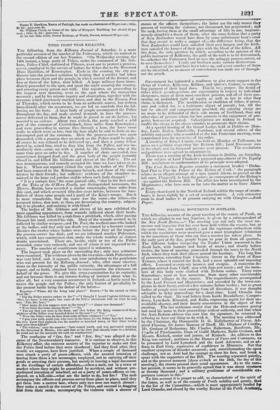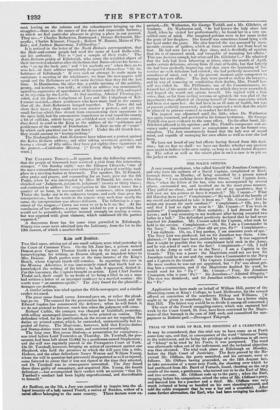POLITICAL MOVEMENTS IN SCOTLAND.
THE following account of the great meeting of the county of Perth, to which we alluded in our last Number, is given by a correspondent of the Neu, North Briton.—" The meeting was not only the most nu- merous and imposing that has ever been held within the county, but, at the same time, the most orderly ; and the rapturous enthusiasm with which the resolutions were received gave a most triumphant refutation to the assertions of those who say that a reaction has taken place. lit the early part of the day, people began to pour in from all quarters. The different bodies composing the Trades' Union mustered in the South Inch, with banners and bands of music ; and shortly before twelve, the hour of meeting, proceeded through the town to the North Inch, where they took their places around the hustings. The long line of procession, extending from Charlotte Street to the front of Rose Terrace, where it entered the Inch, had a most splendid and imposing effect. I counted seventy-six banners and ensigns. A numerous de- putation arrived from Crieff, also with flags and music ; and the mem- bers of this body were clothed with Reform sashes. There were deputations, more or less numerous, from many other considerable towns and villages in the county. The requisitionists, accompanied by the Lord Provost and Magistrates, and preceded by the town-ser- geants in their livery, arrived a few minutes before twelve ; but as great bodies of people were seen comine-t' from all directions, it was thought advisable to delay proceedings for a short time. Lord Ormelie was called to the chair. He read letters from Lords Breadalbane, Camper- down, Lynedoeh, Kinnaird, and Rollo, expressing regret for their un- avoidable absence, and their hearty concurrence in the object of the meeting. The last nobleman stated that the Hole-and-corner gentry had used his name in their proceedings without authority, and that when the Anti-Reform address was sent him for signature, he returned it, refusing to have any thing to do with it. The meeting was addressed by the Chairman the Honourable D. G. Hallyburton of Pitcur, Ad- miral Fleming, Sir James Ramsay of Banff, Mr. Oliphant of Condie, Mr. Graham of Redgorton Mr. Charles Robertson, Bandirran, Mr- Ccndie of Pitwhanatrie, Dean of Guild Mathews, Bailie Graham, and Messrs. Kinloch, senior and junior, of Kinloch. An address to the King was carried ; petitions to the Houses of Peers and Commons, to be presented by Lord Lynedoch and the Lord Advocate, and an ad- dress to Earl Grey, expressive of confidence in Ministers. Not the smallest symptom of disorder occurred; and, notwithstanding the opent challenge, not an Anti had the courage to show his face, and break a. spear with the supporters of the Bill. The meeting separated quietly,., and at the present moment [three o'clock on the 16th, the day of the meeting], the streets present their usual appearance. As to the num- ber present, it seems to be generally agreed that it was about nineteei. or twenty thousand ; and a military gentleman of considerable *x... perience concurs in this." To this account it is proper to add, as characteristic of the spirit of the times, as well as of the county of Perth nobility and gentry, that in the list of the Committee—which is most appropriately headed flr Lord Ormelie, and closed by the worthy Rector of the Perth Academy, rank leading on the column and the schoolmaster bringing up the stragglers—there are the names of five douce and respectable farmers ; to which we feel particular pleasure in giving a place in our journal. They are—" Charles Robertson, Buttergask ; George Richmond, Mo- neydie ; Charles Kinnear, Fingask ; Robert W. Ramie, Mains of Pit- four; and Andrew Bannerman, Tullibardine." It is noticed in the letter of the North Briton's correspondent, that the .Hole-and-corner people had used the name of Lord Rollo with- out his authority. This is "just a sample of their trade." The • Anti-Reform gentry of Edinburgh, who court the wrinkled object of their interested adoration after the fashion that Burns advises his lover— who "go up" the back gate" and "let naebody see" when they go to woo her—in their address impudently designated themselves " the in- ' habitants of Edinburgh." If ever such an attempt . be made again to , caricature a meeting of the inhabitants, we hope the newspapers will speak and the Reformers act-with more decision than they did the last tune. In Dumbarton, the other day, a public meeting of the nobility, gentry, and heritors, was held ; at which an address was unanimously agreed.to, expressive of approbation of Ministers and the Bill, and regret • at its rejection by the Lords. At that meeting, Admiral Fleming pre- sided, and Sir James Colquhoun of Lass and Mr. Colquhoun of Kul- , lermont'assisted,—three gentlemen who have more land in the county than an, the 'Anti-Reformers lumped together. The Tories did not show their faces ; they could not even muster a, protest; and yet the smallfaction which thus shrunk from encountering .their opponents in the open field,.had the consummate impudence to send round the county - a bit of calfskin, which having got scribbled over with obscure names, . they dared to send to the King as the address of the "noblemen and gentlemen of the county of Dumbarton." Is there no rule of " court" by Which such practices can be put down ? Under the old Scotch law, they would amount to "leasing-making." . The Roxburghshire.Anti-Reformers have taken out a protest against the Kelso Reform address' and after raking seventeen parishes, and boring a circuit of fifty miles, they have got eighty-three signatures to tke protest.—Caledonian Mercury. [" Every thing helps," said the wren.] • THE UNKNOWN TONGCE.—It appears, from the following account, that the people of Greenock have received a visit from this interesting stranger. " On Sunday night," says the Glasgow Chronicle, "one of the most extraordinary scenes ever witnessed in a place of worship, took , place in a meeting-house at Greenock. The speaker, Mr. API/maid, after praise and prayer, and expounding for an hour, gave out the 9th
• Psalm, when he was interrupted by Miss M'Donald, his sister, who shrieked out ' Judgment, judgment, judgment !' twenty or thirty times ; and continued to address the congregation in the loudest tones for a quarter of an hour, in unconnected short sentences, often repeated. Thrice she broke out in the 'unknown tongue, and each time gave the interpretation ; but the words in the tongue were each time nearly the same, the interpretation was always different. The following is a spe- cimen of the tongue—' Corra mo versa e ye la la le ne,' 8ze. At the conclusion of her address, a young man wished to put a ques-tiori, but would not be permitted ; another insisted strongly on reading a verse, but was opposed with great clamour, which continued till the parties separated." A dangerous - fever has for some time prevailed in Edinburgh. Ninety-two cases were admitted into the Infirmary, from the 1st to the 13th instant, of which a number died.



























 Previous page
Previous page